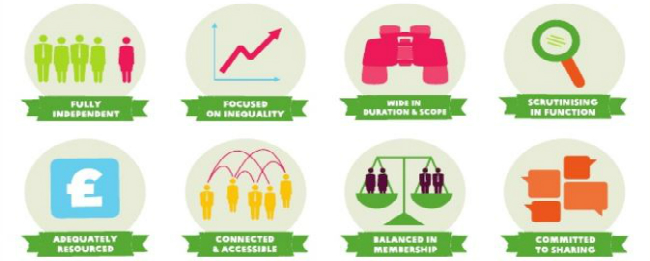Joint call issued as new Commission meets for the first time today.
Scottish politicians must ‘urgently scale up’ their policy action to address the scandalous levels of poverty and inequality in Scotland, an influential and diverse group of Scottish organisations said today.
In an open letter to all Scottish party leaders, the 37 organisations including Oxfam Scotland, The Poverty Alliance, the STUC, SCVO, Shelter Scotland and the Church of Scotland, as well as the Children and Young People’s Commissioner, say a failure to adequately address economic inequality is holding back attempts to tackle poverty in Scotland. Right now, one in five people in Scotland live in poverty – a figure which has remained stubbornly high.
It comes amid predictions that economic inequality will worsen across the UK without increased political action to reduce the gap between the rich and the rest.
The letter’s release coincides with today’s inaugural meeting of Scotland’s new Poverty and Inequality Commission in Edinburgh. The Commission is Chaired by Douglas Hamilton alongside his two Deputy Chairs, Naomi Eisenstadt and Kaliani Lyle and five other Commissioners.
The letter – which is also signed by Engender, Inclusion Scotland, the Poverty Truth Commission, Barnardos, Citizens Advice Scotland, One Parent Families Scotland, the Scottish Refugee Council and the Scottish Community Development Centre, among others – calls for Scotland’s party leaders to endorse the Commission’s work, place the Commission on a statutory footing in the near future and to outline their party’s policies to build a fairer country so they can be examined by the Commission.
The letter says: “Extreme economic inequality is a global issue but the concentration of money at the top of Scottish society is holding back efforts to end the scandal that nearly one in five people in our rich country live in poverty.
“It is not a coincidence that a record number of Scots are turning to food banks when the incomes of the richest 10% of people in Scotland exceed those of the bottom 40% put together. Wealth is even more unequally shared: the richest 1% own more than the bottom 50% put together. Worryingly, without action, this extreme inequality is predicted to get worse.
“Many of our organisations are all too familiar with the distressing consequences: from the parents who don’t have enough money to feed their children to those women and men stuck on zero hours contracts or in low-paid jobs which fail to pay enough to make ends meet. We recognise that women are often impacted hardest and generally face higher levels of economic inequality.“
The agencies say some of the foundations for a fairer Scotland are being laid. However, they point out that while there appears to be cross-party political commitment to tackling inequality and poverty, as well as public support, the policies needed to achieve these goals are not yet sufficiently in place. While not all powers rest in Scotland, the organisations say the Scottish Parliament must do more to maximise the use of devolved levers.
The letter states: “Encouragingly, as the leaders of Scotland’s main political parties, you have all stated your concern about the scale of economic inequality and poverty in Scotland. It’s now time to urgently scale up Holyrood’s policy action to match the depth of the challenge we face.
“The Poverty and Inequality Commission creates a new platform for radical ideas but it cannot deliver change on its own, or during its first day on the job. It will need civil society organisations, community activists and politicians to help build momentum for change.
“We commit to playing our part and we urge you to do the same by endorsing the Commission’s work and by setting out your party’s policies to achieve a fairer Scotland for the Commission to scrutinise.”
The First Minister, who will today outline the Scottish Government’s Programme for Government at the Scottish Parliament, has said the Commission will have a key role in “scrutinising how governmental budgets, policy and practice can have the strongest impacts on poverty and inequality”.
In their letter, the organisations say the Commission must operate independently of all political parties and say the best way to achieve this is by placing the Commission on a statutory footing with it reporting directly to the Scottish Parliament.
Encouragingly, it is understood that options to deliver this are currently being considered by the Scottish Government.
—– ENDS —–
For more information please contact Rebecca Lozza, Media and Communications Officer, Oxfam Scotland, 0141 285 8875 or RLozza1@oxfam.org.uk
NOTES TO EDITORS
- A full copy of the letter sent to party leaders today is available here: https://bit.ly/2w1CQgA
- A full list of signatories: Advocard, Alzheimer Scotland, ASH Scotland, Barnardos, Bethany Christian Trust, Children 1st, Children & Young People’s Commissioner Scotland, Children in Scotland, The Church of Scotland, Citizens Advice Scotland, Close the Gap, CRER (Coalition for Racial Equality and Rights), Community Food Initiatives North East (CFINE), Child Poverty Action Group in Scotland (CPAG), Cyrenians, Disability Agenda Scotland (DAS), Energy Action Scotland (EAS), Engender, Fairshare, Glasgow Council for the Voluntary Sector (GCVS), HIV Scotland, Inclusion Scotland,
Move On, One Parent Families Scotland, Oxfam Scotland, Poverty Alliance, Poverty Truth Commission, Scottish Community Development Centre (SCDC), Scottish Refugee Council, Scottish Trades Union Congress (STUC), Scottish Women’s Aid, Scottish Council for Voluntary Organisations (SCVO), Shelter Scotland, SURF Scotland’s Regeneration Forum, Transform (Dundee), University West Scotland (UWS), West Dunbartonshire Community Foodshare (WDCF). - In April 2017, Oxfam Scotland released a report Building a More Equal Scotland, Designing Scotland’s Poverty and Inequality Commission which laid out the scale of the challenge faced by the Commission, recommendations of how it should be set up and the key areas for Scottish Parliament action. Read here: https://bit.ly/2fLkIoK
- Find out more about Scotland’s Poverty and Inequality Commission here https://www.gov.scot/Publications/2017/07/1335
